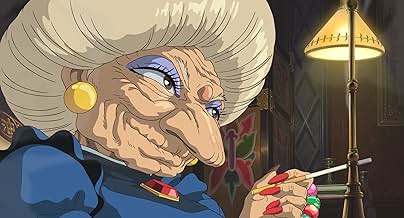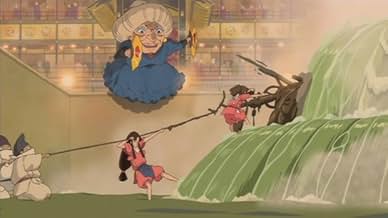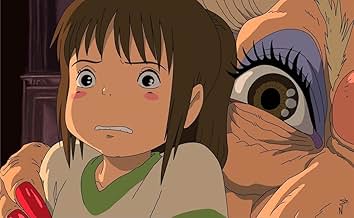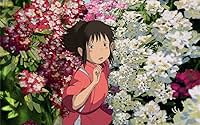Uma garota é obrigada a mudar de cidade com seus pais contra a sua vontade. Durante a viagem, eles decidem pegar um atalho e se perdem, chegando a um estranho edifício, onde adentrarão um mi... Ler tudoUma garota é obrigada a mudar de cidade com seus pais contra a sua vontade. Durante a viagem, eles decidem pegar um atalho e se perdem, chegando a um estranho edifício, onde adentrarão um misterioso mundo de monstros e espíritos.Uma garota é obrigada a mudar de cidade com seus pais contra a sua vontade. Durante a viagem, eles decidem pegar um atalho e se perdem, chegando a um estranho edifício, onde adentrarão um misterioso mundo de monstros e espíritos.
- Ganhou 1 Oscar
- 58 vitórias e 31 indicações no total
Daveigh Chase
- Chihiro
- (English version)
- (narração)
Suzanne Pleshette
- Yubaba
- (English version)
- (narração)
- …
Miyu Irino
- Haku
- (narração)
Rumi Hiiragi
- Chihiro Ogino
- (narração)
- …
Mari Natsuki
- Yubaba
- (narração)
- …
Takashi Naitô
- Akio Ogino
- (narração)
Yasuko Sawaguchi
- Yûko Ogino
- (narração)
Tatsuya Gashûin
- Aogaeru
- (narração)
Ryunosuke Kamiki
- Bô
- (narração)
- (as Ryûnosuke Kamiki)
Yumi Tamai
- Rin
- (narração)
Yô Ôizumi
- Bandai-gaeru
- (narração)
Koba Hayashi
- Kawa no Kami
- (narração)
Tsunehiko Kamijô
- Chichiyaku
- (narração)
Takehiko Ono
- Aniyaku
- (narração)
Bunta Sugawara
- Kamajî
- (narração)
Enredo
Você sabia?
- CuriosidadesThe cleansing of the river spirit is based on a real-life incident in Hayao Miyazaki's life in which he participated in the cleaning of a river, removing, among other things, a bicycle.
- Erros de gravaçãoAfter Haku flies out of the bedroom we see Sen's left hand touching more of the blood on the railing. The elevator attendant sees it on the same hand after grabbing her arm as she tries to board it. Not much later we see her looking at the same hand again before running across the pipe. It isn't till after being held captive by the baby under the cushions that the blood switches hands as he holds her by the left arm revealing no blood on that hand at all.
- Cenas durante ou pós-créditosThe credits have a series of still images from the film. The last image before the film fades is Chihiro's shoe in the river.
- Versões alternativasVarious dialog is added to the English dub to explain settings, translate Japanese text, or traditions; for example, when Chihiro first sees the bathhouse, in the English dub, she says "It's a bathhouse", which isn't present in the Japanese version.
- ConexõesEdited into Miyazaki Dreams of Flying (2017)
Avaliação em destaque
Last year I saw Spirited Away on it's UK release. I've never been a particular fan of anime, and it didn't really occur to me that I was watching a foreign language film dubbed into English (or 'American'). I can't imagine seeing a live action foreign language film dubbed into another language, but hey, this is a kids cartoon, what does it matter? Up to a point it didn't, because I loved the film. I enjoyed it so much I set about digging up the Studio Ghibli/Miyazaki back catalogue, in the process Sprited Away was filed away as one of the lesser Ghibli's - still great, but compared to Laputa, Grave of the Fireflies and a few others, it seemed a little weak.
BUT... I recently re-watched it on DVD with the subtitles and found the difference unbelievable. The film came alive like the other Miyazaki's I've seen. It seemed infinitely more layered, detailed, intelligent and witty than I remembered. Could it be that retaining the intended performances (even if the words are unintelligible) can make that much difference? Maybe the dub was just poorly done? Or was it just because I was now versed in the language of Ghibli? As a little experiment I decided to re-watch some of the film with both the English subtitles and English language dub in order to compare, I ended watching the whole thing out of morbid fascination. It's simply amazing what a difference there is. Entire scenes change. It's not just that subtle emphasis is shifted or the same points are made in a different manner - in the dub, the subject of whole conversations and scenes are changed, and often to some flat and uninteresting hokum. Relationships between characters are changed, their motivations and personalities are changed, the difference is shocking.
I appreciate western, and particularly American audiences can be put off by subtitles. And cinemas are less likely to show the film anyway. It's pointless to be all righteous when, fundamentally, you just want people to see the film. Unless they do, this treasure trove will remain undiscovered, and maybe finding it will encourage people to conquer the 'subtitle demon' (as Miyazaki might call him). But the problem is the quality of these dubs, and the liberties taken with the source material. Of course, without speaking Japanese, who can say it's not the subtitles that are way off? They're probably written by westerners too. But the dub just stinks of Disneyfication. Saturday morning generic nonsense. The challenging, uncompromising and emotionally ambitious nature of the film is severely watered down.
A fair question might be, 'if it's so bad why was it so successful?' The success is evidence of the films staggering quality. Even so, it hardly challenged whatever Jerry Bruckheimer movie was showing at the time. In Japan it's the biggest grossing film in history. 'Go figure,' as Chihiro wouldn't say.
BUT... I recently re-watched it on DVD with the subtitles and found the difference unbelievable. The film came alive like the other Miyazaki's I've seen. It seemed infinitely more layered, detailed, intelligent and witty than I remembered. Could it be that retaining the intended performances (even if the words are unintelligible) can make that much difference? Maybe the dub was just poorly done? Or was it just because I was now versed in the language of Ghibli? As a little experiment I decided to re-watch some of the film with both the English subtitles and English language dub in order to compare, I ended watching the whole thing out of morbid fascination. It's simply amazing what a difference there is. Entire scenes change. It's not just that subtle emphasis is shifted or the same points are made in a different manner - in the dub, the subject of whole conversations and scenes are changed, and often to some flat and uninteresting hokum. Relationships between characters are changed, their motivations and personalities are changed, the difference is shocking.
I appreciate western, and particularly American audiences can be put off by subtitles. And cinemas are less likely to show the film anyway. It's pointless to be all righteous when, fundamentally, you just want people to see the film. Unless they do, this treasure trove will remain undiscovered, and maybe finding it will encourage people to conquer the 'subtitle demon' (as Miyazaki might call him). But the problem is the quality of these dubs, and the liberties taken with the source material. Of course, without speaking Japanese, who can say it's not the subtitles that are way off? They're probably written by westerners too. But the dub just stinks of Disneyfication. Saturday morning generic nonsense. The challenging, uncompromising and emotionally ambitious nature of the film is severely watered down.
A fair question might be, 'if it's so bad why was it so successful?' The success is evidence of the films staggering quality. Even so, it hardly challenged whatever Jerry Bruckheimer movie was showing at the time. In Japan it's the biggest grossing film in history. 'Go figure,' as Chihiro wouldn't say.
- Balibari
- 17 de out. de 2004
- Link permanente
Principais escolhas
Faça login para avaliar e ver a lista de recomendações personalizadas
Detalhes
- Data de lançamento
- Países de origem
- Centrais de atendimento oficiais
- Idiomas
- Também conhecido como
- El viaje de Chihiro
- Empresas de produção
- Consulte mais créditos da empresa na IMDbPro
Bilheteria
- Orçamento
- US$ 19.000.000 (estimativa)
- Faturamento bruto nos EUA e Canadá
- US$ 15.205.725
- Fim de semana de estreia nos EUA e Canadá
- US$ 449.839
- 22 de set. de 2002
- Faturamento bruto mundial
- US$ 358.380.478
- Tempo de duração2 horas 4 minutos
- Cor
- Mixagem de som
- Proporção
- 1.85 : 1
Contribua para esta página
Sugerir uma alteração ou adicionar conteúdo ausente






























